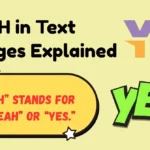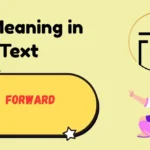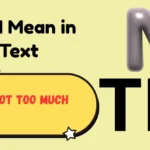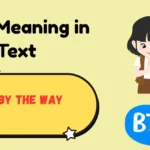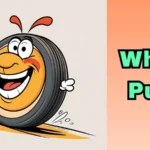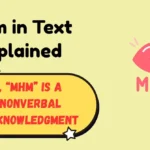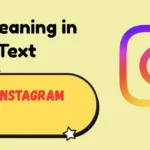Digital communication is packed with short replies that can mean a lot more than they appear. One of the most common examples is “mhm.”
You’ve probably seen it pop up in group chats, work messages, or even in conversations with someone you care about.
At first glance, it looks like a lazy “yes.” But depending on the situation, it can carry agreement, sarcasm, boredom, or even subtle disapproval.
This guide breaks down what “mhm” means in text, when to use it, when not to, and what to say instead. By the end, you’ll know how to use “mhm” wisely and avoid misunderstandings that can damage personal or professional conversations.
What Does “Mhm” Mean in Text?
At its core, “mhm” is a nonverbal acknowledgment—a typed version of the sound you’d make in real life when humming in agreement. It’s softer than a clear “yes” but stronger than silence.
Key points about “mhm”:
- It usually signals agreement or understanding.
- It can also show you’re listening without interrupting.
- The tone depends on context, relationship, and mood.
Think of it as the text equivalent of nodding your head in a conversation.
The Different Nuances of “Mhm”
What makes “mhm” tricky is that the same word can carry different meanings. Here are the most common ones:
Agreement
When someone says something you agree with, a quick “mhm” shows support without needing extra words.
- Example:
- Friend: “This pizza is so good.”
- You: “Mhm.” (meaning “Totally agree!”)
Disinterest
Sometimes “mhm” comes across as a polite way of saying, I’m not really into this conversation.
- Example:
- Friend: “I’ve been talking about my fantasy football team for 20 minutes.”
- You: “Mhm.” (meaning “I’m acknowledging you, but I’m not engaged.”)
Sarcasm
Used with the wrong tone, “mhm” can sound dismissive or even mocking.
- Example:
- Someone: “I’ll definitely pay you back tomorrow.”
- You: “Mhm.” (sarcastic disbelief)
Polite Filler
“Mhm” is sometimes just a neutral placeholder to keep a conversation moving, similar to saying “uh-huh” in person.
- Example:
- Coworker: “So then I sent the report to the client…”
- You: “Mhm.” (meaning “Go on, I’m listening.”)
Why Tone and Context Matter with “Mhm”
Tone transforms the meaning of “mhm.” In a face-to-face talk, your voice and facial expression help. In text, though, the receiver has no cues. That’s why “mhm” can so easily be misread.
Examples of tone shifts in texting:
- Supportive tone: “Mhm 😊” → signals warmth and agreement.
- Neutral tone: “mhm” → plain acknowledgment.
- Annoyed tone: “Mhm…” → implies disinterest or irritation.
Quick tip: If the relationship is delicate (like at work or in a new friendship), it’s better to write something clearer than just “mhm.”
Common Situations Where “Mhm” Appears in Texts
You’ve probably noticed “mhm” shows up in different settings. Let’s break it down with examples.
| Situation | Example of “mhm” | Likely Interpretation |
|---|---|---|
| Casual chat with friends | “Want to watch a movie?” → “Mhm” | Quick, friendly yes |
| Romantic conversation | “I love you” → “Mhm” | Risky; may sound uninterested |
| Workplace texts | “Did you get my email?” → “Mhm” | Too vague; could cause confusion |
| Family group chat | “Dinner’s at 7.” → “Mhm” | Simple acknowledgment |
Notice how the same reply feels different depending on who you’re texting.
When Not to Use “Mhm”
While “mhm” works fine in casual chats, there are moments where it’s better to avoid it:
- Professional communication: It may look careless or disrespectful.
- Important details: Saying “mhm” when someone’s giving instructions can create confusion.
- Emotional conversations: Using it with a partner or friend who’s sharing feelings may come across as dismissive.
Case Study:
A manager asks an employee, “Did you update the client on the deadline?”
- Employee replies: “Mhm.”
- The manager is left wondering: Does that mean yes, maybe, or just I heard you?
Result: miscommunication.
Polite & Clear Alternatives to “Mhm”
Here are better phrases to use instead of “mhm” depending on the tone you want:
- Yes, definitely.
- That makes sense.
- Got it.
- I agree.
- Sure thing.
- Sounds good.
- Okay, I understand.
- Exactly.
- Absolutely.
- I see what you mean.
These are short, clear, and polite. They reduce the risk of being misunderstood.
Rewriting Casual “Mhm” Replies with Better Alternatives
Let’s see how upgrading “mhm” changes conversations.
Example 1:
- Friend: “Want to grab lunch?”
- You: “Mhm.” → vague
- You (better): “Sure, I’d love to.”
Example 2:
- Partner: “I feel like you don’t listen to me.”
- You: “Mhm.” → dismissive
- You (better): “I’m listening, tell me more.”
Example 3:
- Boss: “Did you complete the report?”
- You: “Mhm.” → confusing
- You (better): “Yes, I sent it this morning.”
Small changes make a big difference in how you’re perceived.
Cultural and Generational Views of “Mhm”
How people interpret “mhm” often depends on age and culture.
- Younger generations (Gen Z, Millennials): Use “mhm” freely in casual texting, often with emojis.
- Older generations: Sometimes find it curt or even rude.
- Cross-cultural views: In some languages, a humming acknowledgment doesn’t exist, so “mhm” may feel unfamiliar or awkward.
Quote from a communication coach:
“Short text replies are never neutral. They carry emotional weight depending on the relationship, timing, and culture.”
Overuse of “Mhm” and Why It’s Problematic
Relying too much on “mhm” creates problems:
- Signals laziness: It looks like you didn’t want to put effort into the conversation.
- Weakens emotional bonds: Relationships need thoughtful replies to grow.
- Can appear dismissive: Especially in sensitive conversations.
Fact: Studies on digital communication show that short, repeated replies often lead to perceptions of emotional distance.
How to Choose the Right Response Instead of Just “Mhm”
Here’s a simple guide to picking the right tone:
| Context | Instead of “Mhm” Say… |
|---|---|
| Casual conversations | “Totally!” / “For sure!” / “Yeah, that’s true.” |
| Professional chats | “Yes, I got it.” / “Understood.” / “Confirmed.” |
| Romantic or empathetic | “I hear you.” / “That means a lot.” / “I’m with you.” |
This ensures you sound clear, warm, and appropriate in every situation.
Final Tips for Using “Mhm” Wisely
- Use it sparingly—don’t let it replace real replies.
- Add emojis if you want to soften the tone.
- Think about the relationship and situation before typing it.
- When in doubt, choose clarity over convenience.
FAQs
What does “mhm” mean in text?
It usually means agreement or acknowledgment, like saying “yes” or “uh-huh,” but the tone depends on context.
Is “mhm” rude in texting?
Not always. It can be casual and friendly, but in some situations it may feel dismissive or uninterested.
Can I use “mhm” in professional messages?
It’s best to avoid it in work or formal communication since it may come across as unclear or careless.
What are better alternatives to “mhm”?
Try replies like “Yes, definitely,” “Got it,” or “Sounds good” for clearer and more polite communication.
How do I know if someone’s “mhm” means yes or no?
Look at the context, relationship, and tone. A plain “mhm” may just be acknowledgment, while a cheerful “mhm 😊” likely means agreement.
Why should I avoid overusing “mhm”?
Using it too often can make you seem uninterested, reduce emotional connection, and lead to miscommunication.
Conclusion
“Mhm” may look small, but it carries weight. In texting, it can mean agreement, indifference, sarcasm, or simple acknowledgment. Because tone is invisible in digital conversations, using “mhm” without care often leads to misunderstandings.
The solution is simple: be intentional. Use “mhm” when it truly fits casual chats, but switch to clearer replies in professional, emotional, or important situations. Doing so helps you sound engaged, thoughtful, and respectful—qualities that strengthen every relationship, whether personal or professional.

